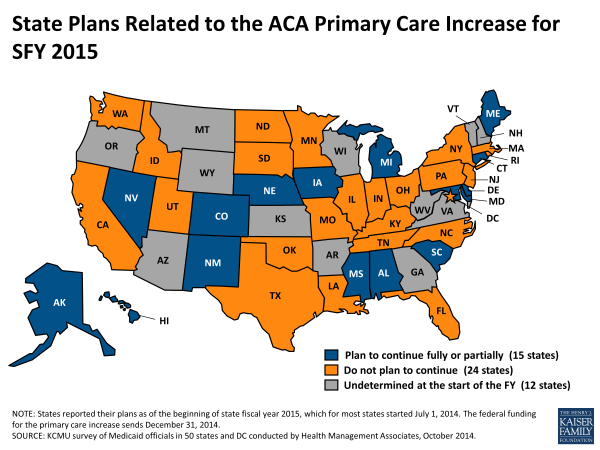As part of the Patient Protection and Affordable Care Act (ACA) Medicaid payments for “primary care” services were temporarily increased to Medicare payment levels. Under this incentive program, the federal government fully funded the difference between what Medicaid would have paid physicians for the delivery of primary care services and what the comparable Medicare payment would be for that same service. The federal government’s enhanced contribution expired on December 31, 2014.
The purpose behind this initiative was to increase support for physicians providing primary care for Medicaid beneficiaries and to improve access to primary care services for Medicaid recipients.
The rate increase applied only to physicians serving Medicaid beneficiaries in both the Medicaid fee-for-service and Medicaid Managed Care programs.
Recently, the Kaiser Commission on Medicaid and the Uninsured conducted a survey of all 50 states to determine whether or if any planned to continue – using normal federal/state Medicaid matching rates – the higher payments for primary care.
According to the KCMU survey, 15 states indicated that they will continue the primary care fee increase in 2015, at least in part. Because the federal funding for the rate increase ended on December 31, 2014, these states will presumably continue the increase at their regular federal matching rate.
For these states, this represents a significant increase in state funds required to continue the primary care increase.
Also, for many of the states that are continuing the higher payments, some modifications are being made (redefining primary care, expanding or contracting the types of providers that qualify for higher payments, etc.).
According to KCMU twenty-four states indicated that they did not plan to continue the ACA primary care increase once the federal funding ended.
Finally, according to the KCMU survey, twelve states had not yet made a decision on this policy and were still evaluating whether the enhanced rates had any impact on provider participation. Some states in the “undecided” category indicated that they were waiting to see whether the federal government would extend the program before making a decision. Despite a last-minute push by some elected officials, Congress failed to extend the program during the lame duck session.

Thanks to Bill Finerfrock, Matt Reiter, Taylor Miller, Emma Goodson and Carolyn Bounds for contributing this article.











